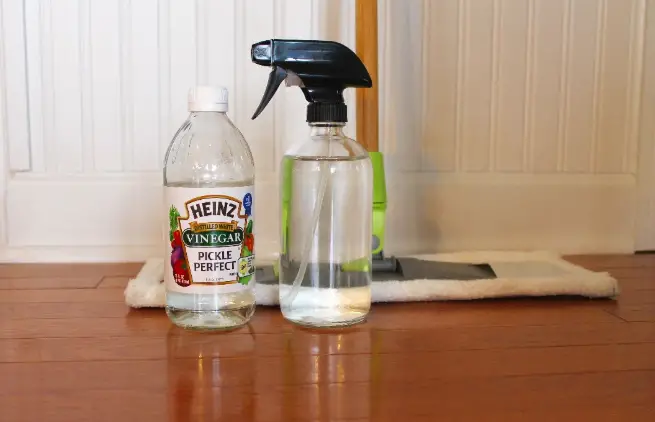Have you ever stared at a scuff mark on your beautiful hardwood floors and pondered the best way to tackle it? The age-old cleaning solution, vinegar, often comes to mind, but can it truly be a safe and effective cleaning agent for your beloved hardwood floors? I’ve always been a fan of natural cleaning solutions, and the thought of using vinegar to clean my floors seemed straightforward. However, the internet is full of conflicting advice, leaving me with more questions than answers. This led me on a quest to understand the true potential of vinegar in hardwood floor maintenance.

Image: mromavolley.com
My journey through the online world of hardwood floor cleaning was a whirlwind of DIY tips and cautionary tales. I discovered that vinegar, while generally safe, can sometimes wreak havoc on the delicate finish of certain hardwood floors. This realization sparked my desire to create a comprehensive guide for fellow hardwood floor owners, unraveling the truth behind vinegar cleaning and providing a safe and effective cleaning approach.
The Power of Vinegar: A Natural Cleaning Agent
Vinegar, a household staple known for its versatility, has long been a natural cleaning solution. Its acidic properties make it a powerful weapon against grime, bacteria, and odors. But its effectiveness on hardwood floors is a topic of lively debate. The key to understanding vinegar’s role in hardwood floor maintenance lies in its interaction with the floor finish.
Hardwood floors are typically covered with a protective sealant, either a polyurethane or a wax finish. This sealant acts as a barrier, safeguarding the wood against scratches, stains, and water damage. It’s this sealant that can be susceptible to the acidic nature of vinegar, leading to potential issues.
Understanding the Potential Risks of Using Vinegar
While vinegar can effectively clean dirt and grime, its acidic nature poses a risk to the sealant on hardwood floors. Depending on the type of sealant and the concentration of vinegar used, these risks include:
- Stripping the Finish: Over time, repeated vinegar cleaning can weaken and strip the protective sealant, exposing the bare wood to damage.
- Dullness and Discoloration: Vinegar can react with certain sealants, creating a dull or discolored appearance on the floor.
- Damage to Unfinished Floors: If your hardwood floors are unfinished, vinegar can penetrate the wood and cause discoloration or damage.
However, the possibility of damage depends heavily on the type of finish on your hardwood floors. If your floors have a polyurethane finish, a strong sealant that is highly resistant to wear and tear, using vinegar diluted with water in moderation should be safe. If you’re unsure about your floor finish, consulting a flooring professional or checking the product specifications is always recommended.
Safe and Effective Methods for Cleaning Hardwood Floors with Vinegar
For those with polyurethane-sealed hardwood floors and a desire to harness the cleaning power of vinegar, here are some safe and effective methods:

Image: www.pinterest.com
Method 1: The Diluted Vinegar Solution
Mix equal parts water and vinegar in a spray bottle. You can adjust the ratio based on your preference, but generally, a 1:1 solution is a good starting point. Spray the solution onto the floor, using a microfiber mop to clean. Avoid soaking the wood with the solution, as excessive moisture can damage the floor.
Method 2: The Vinegar-and-Water Bucket
Fill a bucket with warm water and add a cup of vinegar. Use a microfiber mop to dip into the solution and scrub the floor. Again, avoid excessive soaking and ensure the floor dries thoroughly afterwards.
Tips and Expert Advice for Hardwood Floor Cleaning
1. Test a Hidden Area First
Before applying any vinegar solution to your entire floor, it’s essential to test a small, hidden area. This allows you to observe any reaction or discoloration that may occur while minimizing the risk of damage.
2. Rinse Thoroughly
After cleaning with vinegar, rinse the floor with clean water to remove any residual vinegar. This helps prevent dullness and discoloration while ensuring the floor is free of any cleaning agents.
3. Dry Completely
Thoroughly dry the floor after cleaning, especially if using vinegar. Dampness can lead to mold growth or damage the sealant. A well-ventilated area or a fan can help speed up the drying process.
FAQ: Can You Clean Hardwood Floors With Vinegar?
Here are some frequently asked questions about using vinegar to clean hardwood floors:
Q: Is vinegar safe for all hardwood floors?
A: Not necessarily. Vinegar can be damaging to some sealants, especially wax finishes. It’s always recommended to test a small hidden area beforehand.
Q: How often can I clean my hardwood floors with vinegar?
A: You can clean your hardwood floors with vinegar occasionally, but excessive use can strip the sealant. Aim for a cleaning schedule of once a month or less.
Q: Can I use vinegar on unfinished hardwood floors?
A: It’s not recommended. Unfinished hardwood floors are more vulnerable to damage from vinegar’s acidic nature.
Can You Clean Hardwood Floors With Vinegar
Conclusion
While vinegar can be a powerful natural cleaning agent, its efficacy on hardwood floors depends on the type of sealant used. By understanding the potential risks and employing safe cleaning methods, you can effectively harness the cleaning power of vinegar without compromising the beauty and longevity of your hardwood floors. Remember to test a hidden area first, rinse thoroughly, and ensure complete drying to prevent damage and maintain the lustrous sheen of your hardwood floors.
Are you interested in exploring more natural cleaning solutions for your home? Let me know in the comments below!






